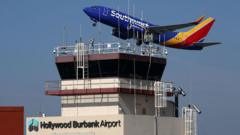Air Canada flight attendants took a stand recently by striking over the issue of unpaid labor, with their rallying cry, "Unpaid work won't fly." This movement highlights the contentious practice in North America's aviation sector where cabin crew often receive no payment for essential ground duties before flights commence. In stark contrast, European airlines tend to offer standard monthly salaries plus compensation for all duties.
As a result of the strike, which disrupted travel during peak summer months, Air Canada and the Canadian Union for Public Employees (Cupe) reached a tentative agreement on Tuesday. While specific terms of the deal have not been fully disclosed, sources indicate it includes a pay increase over time and, importantly, introduces partial pay for boarding duties and cabin secure checks—marking a potential shift in industry standards. Union representatives claimed the victory as "historic," asserting that "unpaid work is over."
Despite the preliminary agreement, reactions among flight attendants remain mixed. A crucial vote on the new terms is anticipated, yet many attendants feel their concerns have not been fully addressed, adding uncertainty to the deal’s future. Similar pay structures without compensation for ground work exist among other airlines, notably Air Transat and WestJet, creating an atmosphere ripe for change across the industry.
Experts speculate that Air Canada's new policy could ignite broader shifts throughout North America, potentially triggering similar demands from other airlines. John Gradek, an aviation management professor, predicted that this precedent could impact all major airlines, as tracking on-ground hours becomes an expected norm rather than an exception.
The landscape for cabin crew compensation began shifting significantly after the Covid-19 pandemic due to new operational complexities imposed by health protocols. Delta Airlines set the precedent in 2022 by granting pay for ground duties, a move soon mirrored by other US carriers.
Following the Air Canada agreement, airline executives have declared that their flight attendants will receive "industry-leading compensation," including payment for ground work—a decision that may signify lasting change in cabin crew remuneration across the continent.
As contract negotiations continue for other Canadian carriers, the prospect of ground pay being adopted widely becomes increasingly feasible. The recent strike and its outcomes have been viewed as a pivotal moment for workers' rights in Canada, especially given the public’s support for the cabin crew amid discussions of unpaid labor and compensation fairness. This situation underscores the significance of organized labor efforts in reshaping employment standards in the airline industry.






















